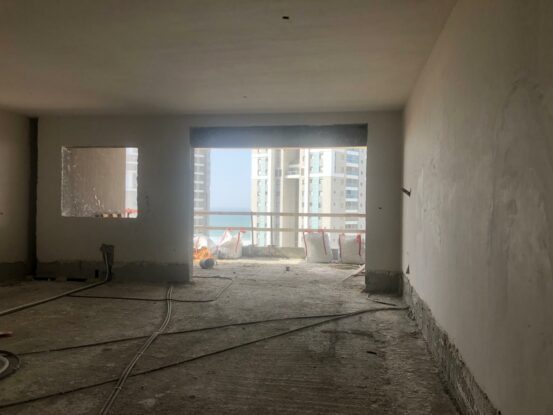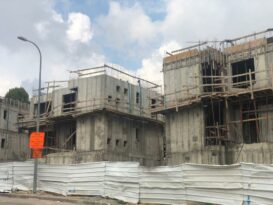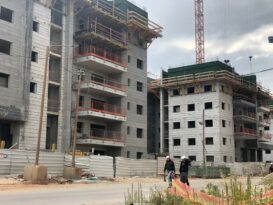New legislation that protects buyers of new homes from unpredictable price increases of hundreds of thousands of shekels; an increase in interest rates that is expected to moderate the sharp price increases of the past year and a half; and an upturn in the dollar-shekel rate that almost eliminates the price increase of the past year for households whose income is in dollars. The Israeli apartment market is going through a period of profound transformation.
The past few weeks have seen changes that could have substantial effects on the Israeli housing market. On the one hand, the macroeconomic environment in which the market operates is changing rapidly with a further increase in the Bank of Israel interest rate which is expected to affect home prices and may even lead to a slowdown in the volume of construction. On the other hand, new legislation approved in recent days makes the purchase of new apartments more attractive. And how does the recent increase in the dollar-shekel rate affect the market? Now is the time to get to know the new rules by which the Israel real estate market operates.
The law that protects homebuyers
Just before its dissolution, the Knesset made a decision that is expected to significantly benefit buyers of new apartments – the cancellation of the full linkage of the apartment price to the construction cost index. On Thursday, the law came into force and is now binding on all residential construction developers.
According to the amendment, construction companies are now allowed to link to the Construction Cost Index only the portion of the price that is attributable to the construction itself, and no more than 40% of the apartment price. The amount to be paid upon the signing of the sales contract cannot be linked to the index at all. Further, according to the amendment, the price of the apartment cannot be linked to the index after the delivery date specified in the contract, even if the apartment is delivered late.
This is a significant modification at a time when the construction cost index is rising sharply, both due to the ongoing effects of the COVID-19 pandemic which is hampering the movement of goods and manpower, and due to the war raging in Ukraine for the past five months. Over the last year, the CPI has increased by 6.6 percent, and over the past two years, it has increased by about 10 percent. As a result, the linkage of the entire price of a new apartment to the index is highly risky and may increase the price of an apartment by hundreds of thousands of shekels. Amending the law now will allow buyers of new homes to pay less and purchase with more certainty, making the purchase a more attractive transaction.
The amendment was received with disrepute by contractors — some have already announced that they would increase the initial price of the apartments in order to absorb the losses that the amendment is expected to cause them. However, in the current market situation, where there is already a marked decline in sales, and against the background of the increase in the Bank of Israel interest rate (which we will reach further), it is doubtful whether they will be able to significantly increase home prices.
Another amendment that works in favor of homebuyers is a reduction in grounds for which a developer would not have to compensate a buyer for the delay in the delivery of a new apartment. If in the past the developers could depend on a variety of reasons, according to the new amendment, they will be exempt from paying compensation only if the delay were due to an act or an omission on the part of the buyer himself. In cases where the apartment is delivered with a delay of at least one to four months, the construction company will pay compensation in the amount of full rent (100%), and in the event of a delay of five months to ten months, the construction company will pay the buyers a monthly payment at a rate of 125% of the rent in the area. For any delay beyond ten months, compensation will be imposed in the amount of 150% of the rent in the area.
The dollar-shekel rate is at a two-year high
After almost two years of decline, to a historically low value of NIS 3.08 per dollar, since January the dollar has returned to a steady increase against the shekel, and as of this writing, it has been around NIS 3.50 per dollar. This is the highest level of the dollar in two years, as well as a sharp increase of 13 percent in the dollar’s exchange rate against the shekel within a period of six months.
For anyone whose income is in dollars, this is good news that may make it easier to buy an apartment in Israel, where home prices have risen sharply in recent years. An increase of 13 percent in the dollar’s exchange rate almost completely offsets the increase in home prices in the past year, which was 15.3 percent.
In addition, the behavior of the dollar raises the question of whether, in the case of purchasing a new home from a contractor, it is worthwhile to take advantage of the relative strength of the dollar now and advance payment on the assumption that in the future the dollar may decline, or whether to pay a minimal down payment on the assumption that in the coming months, the dollar may rise further. For dilemmas of this kind, it is recommended to consult with foreign exchange experts.
The increase in the interest rate is expected to cool the market
Last week, the Bank of Israel announced a further 0.5% increase in the interest rate, now at 1.2%, with the prime interest rate at 2.7%. Although this is still a relatively low rate, it should be noted that until three months ago, the interest rate was only 0.1%, representing a fairly significant increase in the interest rate. Not only that, but at the press conference where the decision was announced, the Governor of the Bank of Israel announced that during the coming year, the interest rate will continue to increase to 2.75% (4.25% prime rate).
The Bank is carrying out the increase in the interest rate primarily in order to combat inflation, which currently stands at 4.1 percent per year, but the move is also expected to have a significant impact on the housing market. The increase in the interest rate means the end of the “cheap money period” that accompanied the Israeli market for a decade. Lending will now become more expensive, making the mortgage market less attractive.
Will this have an impact on prices? Estimates are that it will. The reality in the Israeli real estate market is that demand is almost always higher than supply, thus experts are careful not to predict a decline in prices, however, the expectation is that at the very least, the sharp increases of the past two years will moderate significantly and perhaps even stop altogether. Another reason why it is hard to believe that we will see a price drop is that financing costs are now expected to increase for developers too, who are likely to build less as a result, and thus supply may be negatively impacted in the long run.
The hope is that the Israeli housing market will calm down and become more stable and healthier as price increases of 15% a year have not done anyone much good. Buyers for obvious reasons, but the contractors also found themselves forced to pay huge sums of money for construction plots greatly increasing the level of risk they take on.
The changes that the Israeli home market is currently facing are taking us into a new chapter, where buying an apartment will hopefully become easier – especially when household income is in dollars. After the past year and a half, during which we saw unprecedented records, the hope is that the market will soon return to a more quiet, calm, and healthy state.








